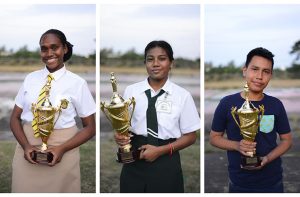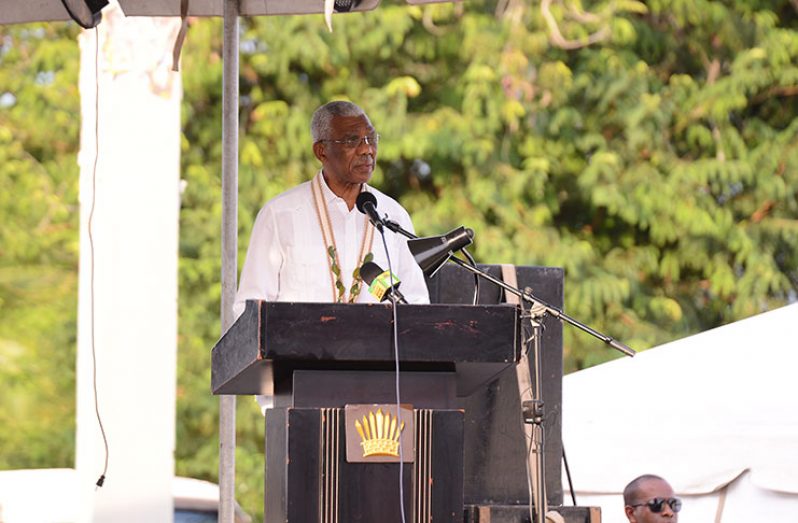– Pres. Granger promises it will happen during ‘Decade of Development’
PRESIDENT David Granger said his Government, through investment in education, has been bridging the gap between the hinterland and the coastland.
At the time, he was delivering the keynote address during the ceremonial launch of Indigenous Heritage Month 2019, on Sunday, at the Indigenous Village, Sophia Exhibition Centre.
Guyana, President Granger said, is poised for a ‘Decade of Development,’ during which continued improvements in hinterland education system would be a key feature.
“Education, next to food, clothing and shelter, is essential to nurturing the next generation and to prepare them for leadership. Plans are on stream to continue improving hinterland education over the next ten years in what I have dubbed the ‘Decade of development’, from 2020 to 2029,” the President told the gathering.
He noted that education is the cornerstone of government’s plan to ensure greater equality between the hinterland and the coastland – a move intended to reduce poverty while providing greater economic opportunities for indigenous communities.
Dubbing it as a great equaliser, the President said education can be used to reverse underdevelopment within the hinterland through job creation. Here in Guyana, he said, hinterland education is on the right path.
The event was also attended by Prime Minister Moses Nagamootoo and his wife, Sita Nagamootoo; Minister of Indigenous Peoples’ Affairs, Sydney Allicock; Minister within the Ministry of Indigenous Peoples’ Affairs, Valerie Garrido-Lowe, and representatives from the National Toshaos Council.
As he launched Indigenous Heritage Month, President Granger reflected on the significant progress made in the hinterland in the area of education since his administration took office in 2015. “The government inherited a public educational system with many problems,” Granger explained.
Prior to 2015, the hinterland was plagued with issues that hampered students’ ability to receive proper education.
The situation at some schools was so severe that it even affected the health and wellbeing of students and in some cases resulted in death.
In 2008, a nine-year-old student died after falling in a pit latrine at the Santa Rosa Primary School. That year, three girls also died in a fire at the dormitory at Waramadong Secondary.
In March 2010, students in Port Kaituma were sent home from the secondary school due to a shortage of food while in 2012, residents protested the overgrown vegetation and poor sanitary facilities at the primary school.
There were reports of sexual molestation at the Aishalton Secondary School in 2011; that same year, three students perished when an abandoned mining pit collapsed. A student of Charity Secondary committed suicide in the school’s dormitory.
Shortage of teacher, poor sanitation, food poisoning and lack of access to potable water were all issues afflicting hinterland schools prior to 2015, President Granger said.
“Parents and residents no longer need to protest against the conditions at hinterland dormitories and schools. Students now feel safer and are more comfortable because of the interventions and improvements which have been made over the past fifty months,” Granger pointed out.
Though the education system is far from perfect, the President said one must admit that significant progress has been made.

“No government could be happy with so many, so frequent and such serious reports. Hinterland education, still, is far from perfect but we have come a long way from those grim, grisly days and progress has been made. We are making progress. The future is bright. Real change takes time but is more enduring. We must continue the task of improving hinterland education,” he reasoned.
Hinterland education has seen massive investments and improvements.
“The Ministry of Indigenous Peoples’ Affairs has increased the number of hinterland scholarships from 110 in 2014 to 187 in 2018. Students are benefitting from access to information communications technology… learning resource centres…access to accommodation for students… The hinterland schools’ feeding programme has been expanded… access to schools has been improved through the Public Education Transportation Services (PETS) – known popularly as the 3 Bs initiative. Hinterland students, also, have been among the beneficiaries of the 1,599 tertiary-level scholarships offered by the Department of the Public Service since 2015,” Granger pointed out.
President Granger reminded that it was some 50 years ago that the focus on hinterland education was first initiated.
“The path and pattern of public education in the hinterland were set in the immediate post-Independence period, fifty years ago. Our first Prime Minister, Forbes Burnham, addressing the Amerindian Leaders’ Conference in 1969, promulgated a policy aimed at ensuring the efficient delivery of public services to the indigenous population,” Granger informed.
He recalled that a drive was launched to expand access to education for hinterland students, explaining that it was facilitated further by the award of scholarships which allowed students free education, at government’s expense, in Georgetown. “Hinterland education, indeed, did receive its first great boost fifty years ago and the task continues today,” he posited.
President Granger said over the past four years there has been a renewed focus on education.
The ‘Decade of Development’ will create an environment for the government to build on what was put in place over the last four years, the President said.
“Hinterland education is being established on a strong footing and will be prioritised over the next ten years. Education will be a cornerstone of the ‘Decade’ which will continue the task of repositioning education which commenced four years ago,” Granger explained.
“The ‘Decade’ will protect citizens’ right to universal primary, secondary and tertiary education. Guyana’s petroleum profits will be deployed, in part, to improve education, including and especially hinterland education. The ‘Decade’ will restore free education as an entitlement. The ‘Decade’ will help to eliminate the educational inequalities between the hinterland and coastland by devoting more resources to hinterland education,” the President further stated.
The launch saw three Indigenous scholarship students being awarded trophies for their outstanding performance at the 2019 Caribbean Secondary Education Certificate (CSEC) and Caribbean Advanced Proficiency (CAPE) examinations.
Being honoured was 16-year-old Alex Abraham, who finished second in the country at the 2019 CSEC examinations, having attained 18 grade ones and two grade twos. Amisha Ramdin from St Ignatius Secondary, who finished fourteenth in the country with 15 grade ones and five grade twos, was also honoured.
Eighteen-year-old Reseda Hack received a trophy for the ‘Best CAPE Hinterland Scholarship Student.’ She wrote seven units, passing five of them with grade ones.
“Hinterland students have demonstrated that once provided with educational opportunities, they are capable of the best performance as proven by one of the country’s top performers at this year’s Caribbean Secondary Education Certificate examinations,” Granger noted.
“Students’ performance is being boosted by investments in better classrooms and laboratories and through information communications technology. The expansion of the school-feeding scheme and the provision of transportation and scholarships have helped to reduce the number of hinterland school drop-outs from 10 primary school students per week in 2014 to an average of 3 students per week in 2017. An average of 17 secondary school students dropped out weekly from hinterland schools in 2014; this has declined to an average of 5 per week in 2017,” the President said.
President Granger said when Guyana’s Oil and Gas Industry comes on stream, the indigenous people will not be left out of the benefits.
“Indigenous people can be assured that they will not be left behind when petroleum production commences next year; the national, natural resources wealth will be developed in a manner to ensure greater equality between the hinterland and the coastland; and there will be adequate provision to strengthen hinterland development, particularly through greater educational investments, interventions and improvements,” the president promised.
In Guyana, September is celebrated both as Indigenous Heritage Month and Education Month, making the president’s speech on hinterland education a fitting one.





.jpg)








